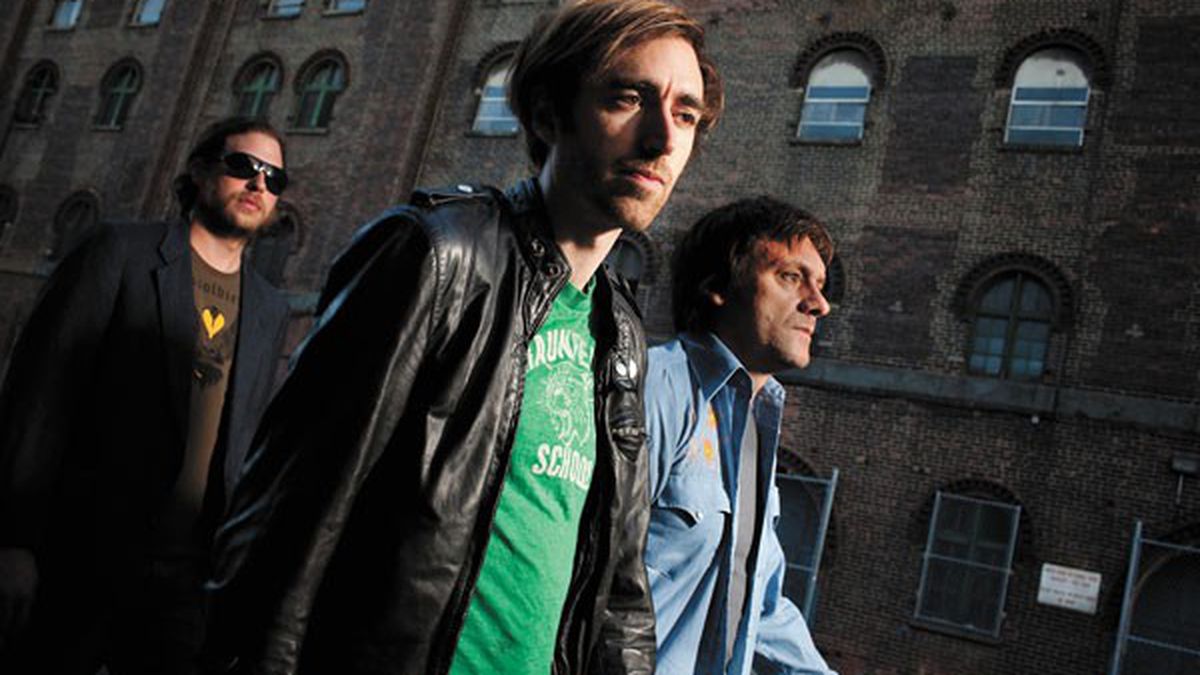When a teenage Oliver Ackermann first heard My Bloody Valentine, he didn’t know what was going on. A friend he traded music with introduced him to the Eighties shoegaze titans as the pair was “probably kind of fucked up and driving around.” Waves of distortion-drenched melody struck and Ackermann was taken aback. “Those sounds were otherworldly,” said the architect of A Place to Bury Strangers, a Brooklyn band that now cranks out gargantuan guitars in the same spirit as My Bloody Valentine. In spite of his confusion, Ackermann was intrigued. “It’s this ambiguous noise where you can almost tell some elements apart. You let your imagination fill in the gaps.”
Around the same time, Ackermann was learning guitar on his dad’s acoustic. Infatuated with punk acts like Minor Threat and the Ramones, he also retained an interest in unpolished rock while transitioning into the sweeter flavors of Slowdive and the Cure. With his skills developing, the high schooler would plug his electric guitar into an amplifier and “crank it up as loud as it can go” when his parents weren’t home. “The amp would have these problems where it would overheat, maybe cut out, and you’d have to kick it to come back on,” he recalled. “I didn’t know how to play guitar so it was much cooler to create noise than struggle with a couple of chords. I get excited about the kind of sounds you’re not supposed to make.”
Even though he cut loose when his elders weren’t around, they supported his artistic inclinations. Early crowds, however, weren’t as kind. He found this out firsthand when he played in Skywave, a trio from Fredericksburg, Virginia, that cranked out a rougher, more fanciful take on shoegaze/noise. “People would get pissed off,” said Ackermann. “We’d get kicked out of clubs, someone would tell us ‘stop,’ or they’d pull the power on us.” Occasionally, audience disapproval was Ackermann’s fault, like the time he “booked some stupid night where they expected us to entertain them with country.”
Eventually leaving the Fredericksburg scene and Skywave, Ackermann headed to New York, where he encountered a batch of musicians who needed a drummer for a Slowdive-esque project. Although the guitarist had no inclination to drum, Ackermann seriously wanted to join the group so he filled the spot. Following the first practice, they reassigned him to his instrument of choice. After a few lineup mutations, Ackermann was the only original left in A Place to Bury Strangers. After recruiting drummer Jay Space and bassist Jono Mofo, the trio issued a self-titled album in 2007 that compiled years’ worth of material.
Compared to Skywave, Ackermann finds that his current band has a different tone. “Maybe it has to do with the name but we focused on being a little bit more evil,” he said, adding that creating music in New York also affected their sound. Seconds later, he brushed his idea aside, saying “I don’t know what I’m talking about. Never mind.”
Yet Ackermann has a point. A Place to Bury Strangers digs deep into violence, morbidity, and melancholia. Song titles include “To Fix the Gash in Your Head,” “She Dies,” “Ego Death,” “Lost Feeling,” “The Falling Sun,” and “Everything Always Goes Wrong.” As one might guess, despondent topics arise: messy breakups, friends in pain, and lingering disappointment. The title track to Exploding Head, released last October, typifies Ackermann’s approach, following grim verse (Cause commotion, cause a scene/Cracking skull, expanding seam) with cryptic analysis (When they can’t kill me, then they know that it’s safe/To come back, come back, come back/Exploding head).
His vocals operate differently from his instruments. Assisted by an array of pedals, A Place to Bury Strangers’ cracked-up rock can generate enough pressure to bend tectonic plates. Ackermann’s singing, however, is subdued, delivered with the majestic frailty of Robert Smith or Ian Curtis. “Maybe I’m not a showman,” he said. “I don’t know if this is what I’m going to do forever but that contrast sounds good. It’s intense, depressing subject matter. That style sounds more real and revealing than trying to force crazy emotion in.”
Though A Place to Bury Strangers has seen its fortunes soar since the members threw themselves into performing (Ackermann claims to have lost track of time in the past four years), the frontman holds no disdain for those who were repulsed by his music; after all, distortion-heavy theatrics were once foreign to him, too. Getting heckled or hit with a bottle hasn’t shamed the three-piece — it has empowered them. Said Ackermann, “I look forward to those moments.”












